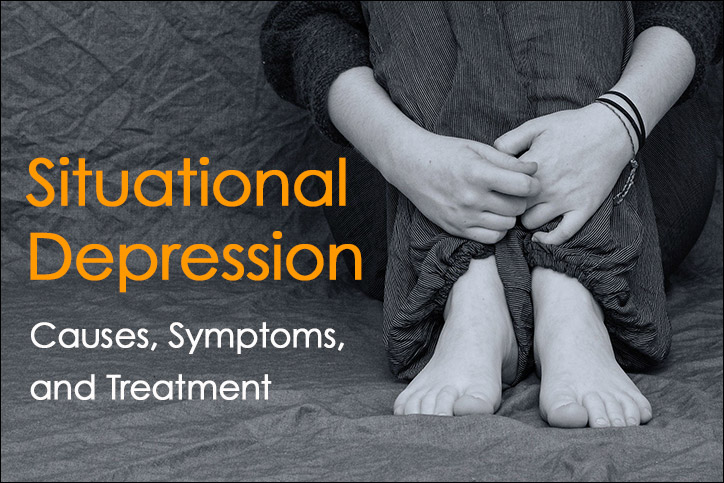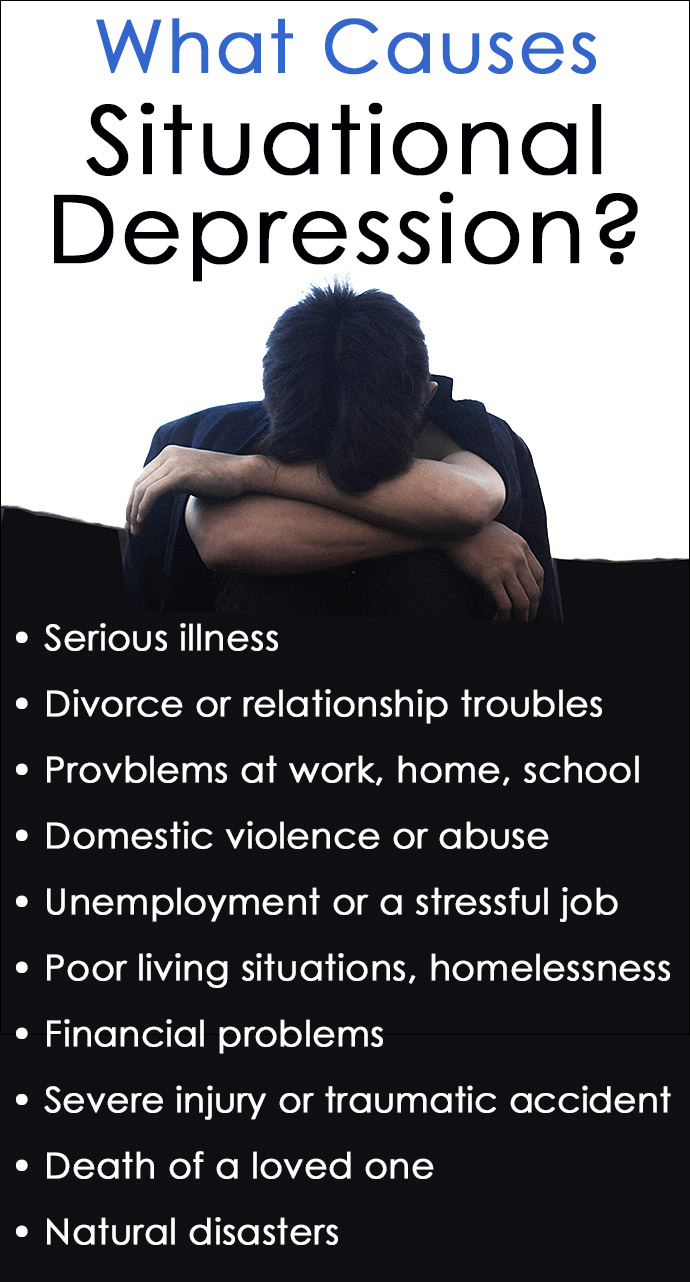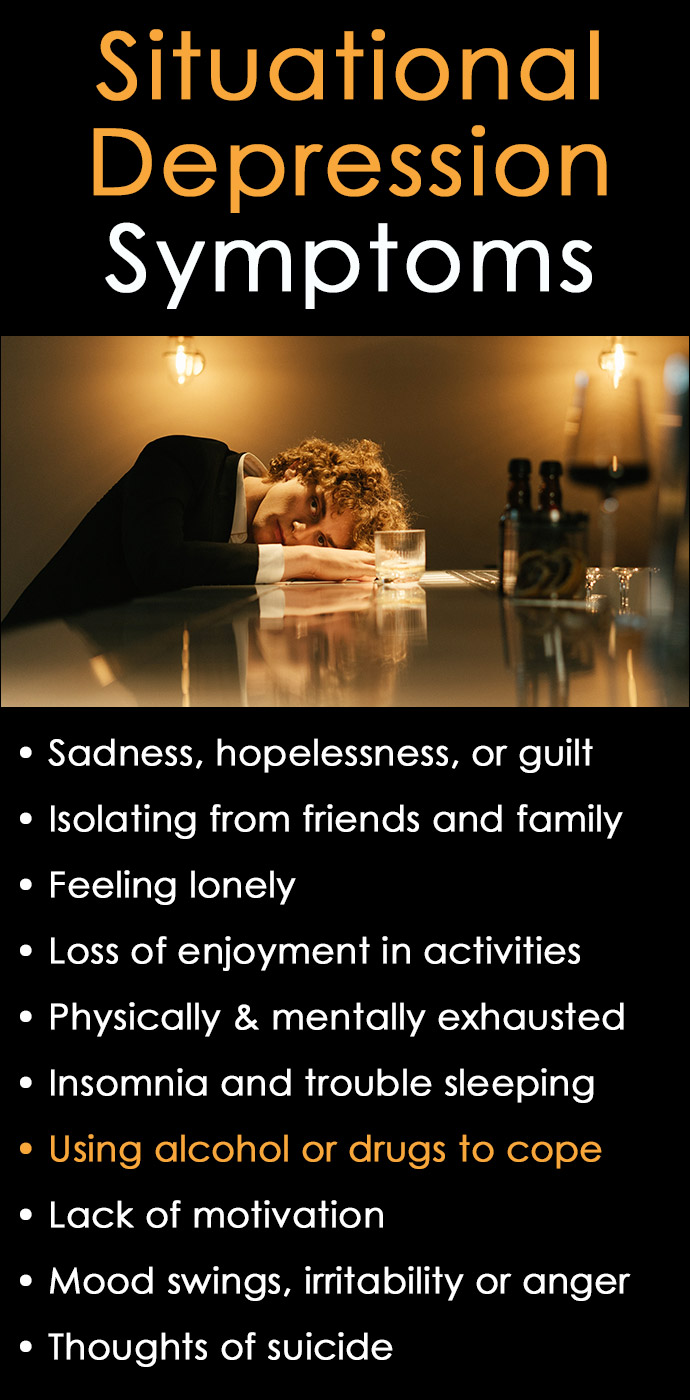Table of Contents
Situational Depression is a condition that is usually related to a stressful or traumatic event that results in depressive symptoms. It is sometimes referred to as Stress Response Syndrome or short term depression.
If you are feeling more stressed than usual, you’re not alone. A 2022 poll by the American Psychological Association found that stress in America has risen to “alarming levels.”
High levels of stress may lead to other mental health issues like temporary depression that can diminish our quality of life.
Understanding the causes and symptoms of situational depression can help people spot problems early and break the cycle of poor mental health.
What is Situational Depression (Short Term Depression)?
Situational depression, or short term depression, is a temporary, stress related condition that usually develops within 90 days of a person struggling with major life changes, or for people who have recently experienced a traumatic event.
While it’s not a clinical diagnosis, situational depression is considered a type of adjustment disorder in the DSM-5.
There are several differences between situational depression and a condition like major depressive disorder (MDD).
Situational depression has a short term duration and is usually caused by stressful life events, whereas major depressive disorder can have a range of causes and last for years.
What Causes Situational Depression?
There are a number of reasons why some people may struggle with situational depression that is triggered by stress or trauma. It’s also important to recognize that major life events often affect each person differently.
While a given stressful event might not have much of an impact on one person, it can severely alter another person’s ability to function.
Common causes of situational depression can include:
- Serious illness, either personally or in a loved one
- Divorce, separation, or ongoing relationship troubles
- Social issues at work, home, or school
- Domestic violence, as well as emotional or physical abuse
- Loss of employment, or starting a new stressful job
- Moving, unstable living situations, homelessness, or living in a dangerous area
- Financial problems
- Serious injury or a traumatic accident
- Death of a loved one
- Natural disasters
Some people may be more likely to experience situational depression as a result of their personal history.
People experiencing multiple stressors at the time same, those with an existing mental health condition, or anyone who experienced childhood trauma can be more susceptible to the condition in high-stress situations.
Situational Depression Symptoms
Stress or trauma that causes situational depression symptoms to appear often range from feelings of persistent sadness or hopelessness, to impairing a person’s ability to carry out day-to-day responsibilities.
Being able to recognize the early symptoms of this form of depression can help people reach out for help, make lifestyle adjustments, and decrease the duration of difficult or painful symptoms.
Symptoms of situational depression include:
- Tearfulness or crying more frequently
- Persistent feelings of sadness, hopelessness, or guilt
- Isolating from friends and family
- Feeling lonely
- Loss of enjoyment in people, places, or activities usually enjoyed
- Physically and mentally exhausted
- Insomnia and trouble sleeping
- Consuming alcohol or drugs as a way to cope with negative feelings
- Lack of motivation to address stressful events or other life issues
- Mood swings, from grief to irritability or anger
- Thoughts of suicide
When a stressful event is completely overwhelming and becomes impossible to handle, it may be a sign of situational depression.
However, it’s important to remember that this form of short term depression is temporary and it is a very treatable condition that often goes away on its own over time.
How to Treat Situational Depression
Though the symptoms of situational depression don’t last as long as other forms of depression or mental health conditions, it does affect a person’s wellbeing.
Getting professional treatment will keep the condition from escalating to a more serious disorder.
Situational Depression Treatment Methods
Treatment for situational depression typically includes a combination of self-care, counseling, and in some cases, medications.
Counseling and Therapy
Individual counseling, or group and family counseling if appropriate, can help lessen the impact of situational depression symptoms. Very often, talking about stress and trauma and how it affects our lives helps to put these problems into perspective.
Cognitive Behavioral Therapy (CBT), which helps people replace negative thought patterns with more useful thinking, is especially effective in treating symptoms of depression.
There are other evidence-based therapies similar to CBT that help people with depression and mental health issues overcome negative thinking and live a more positive life.
Medications
Medications, such as antidepressants, can help ease the symptoms of depression over time. These are often prescribed for long-term forms of depression, although they can also be useful for some people with short-term depression as well.
In more serious cases, anti-anxiety medication may be needed for short-term use.
Treating Complementary Conditions
It’s common for people with mental health issues like depression to use drugs or alcohol as a way to cope with the symptoms.
While this may work temporarily for some people, continued use of substances can lead to addiction, causing a co-occurring disorder of addiction and depression.
When this happens, a dual diagnosis treatment program may be necessary to treat addiction and depression together at the same time.
Self Care
Self Care is the process of developing and maintaining healthy habits that benefit both the body and mind. These practices can include meditation, massage, regular exercise, and a healthy diet.
Focusing on simple self care ideas can have a powerful impact on a person’s ability to deal with stressful events that lead to depression.
As mentioned earlier, situational depression is not a clinical diagnosis so it is not usually included as one of the common types of depression.
Even so, it is still a condition with symptoms related to stress that can affect an individual’s ability to function in a healthy way.
Seeking treatment and practicing self-care strategies can accelerate recovery and return a person to a happier life more quickly.
Treatment will also reduce the possibility of depressive symptoms escalating to something more serious, like a co-occurring disorder or major depression.
Frequently Asked Questions
Is situational depression real?
Yes, situational depression is a real and recognized condition, although it is not considered a clinical diagnosis. It is usually referred to as “adjustment disorder with depressed mood.”
It is a short-term depression that often develops within 3 months of a stressful life event. Even though it is usually temporary, it shares many of the same symptoms as other types of depression, generally in a milder form.
Does situational depression go away on its own?
Situational depression usually goes away on its own within a few weeks to possibly six months after the stress of the triggering event subsides.
Many people find relief from lifestyle changes and self-care strategies like exercise, proper sleep, and meditation to quiet the mind.
It’s important to take all types of depression seriously and if the symptoms persist over a long period of time, it’s necessary to seek professional treatment to avoid progressing to a more serious condition.
What is the difference between situational vs clinical depression?
Situational Depression Characteristics
- Caused by a specific stressful event or lifestyle change
- Begins within 3 months of the triggering event
- Lasts a few weeks to 6 months
- Symptoms are less severe than clinical depression
- Diagnosed as “adjustment disorder with depressed mood”
- Generally improves over time on its own
Clinical Depression Characteristics
- Caused by environmental, genetic, biological, or psychological factors
- Often begins gradually and progressively worsens
- Can be a chronic condition that lasts for months or years
- Symptoms are more severe than situational depression
- Diagnosed as “major depressive disorder”
- Professional treatment is usually required for recovery and can involve psychotherapy, medication, and lifestyle changes
Can situational depression lead to clinical depression?
Yes, situational depression can lead to clinical depression. If the symptoms persist beyond six months, it can be classified as major depressive disorder according to the DSM-5.
If the initial triggering event is not resolved or new stressful events occur, the condition may be diagnosed as clinical depression.
People who experienced childhood trauma or have a genetic historic of depression and other mental health conditions are at a higher risk for clinical depression.
Seeking professional treatment as soon as any form of depression becomes unmanageable is recommended to avoid worsening of symptoms.
How is situational depression diagnosed?
Situational depression is generally diagnosed through the following:
1. Thorough assessment by a physician or mental health professional that includes a review of the patient’s symptoms and medical history.
2. The onset of symptoms begin within 3 months of a triggering event.
3. The symptoms are more severe than a normal stress response and last for a few weeks to six months.
4. The symptoms do not meet the criteria for other mental health disorders like major depressive disorder.





